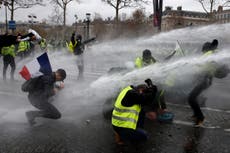Has John Bercow intervened yet again to obstruct Brexit?
As usual, you have to ask the question, what is the most unhelpful thing the speaker could do for the government’s cause?

John Bercow, the speaker of the House of Commons, has put himself at the centre of the Brexit story again.
As usual, you have to ask the question, what is the most unhelpful thing, for the government, that he could do? That is what he has done.
At the start of Friday’s debate, he announced that he had selected no amendments to the government’s motion. That meant that MPs did not vote on an amendment tabled by pro-Brexit Labour MPs led by Gareth Snell, the MP for Stoke, which might have helped persuade a number of Labour MPs to vote with the government.
The amendment would have added to the government’s motion to approve the withdrawal agreement, a commitment to give parliament a say over the negotiations of the long-term trade deal with the EU after Brexit.
Sir Geoffrey Cox, the attorney general, who opened the debate, said that he would have accepted the amendment if the speaker had allowed it. In other words, it would have been added to the government’s motion automatically.
That would have meant that at least six more Labour MPs might have voted for the withdrawal agreement than voted for it in the second meaningful vote on 12 March. As well as Snell, there were another five Labour MPs who signed the amendment who voted against the government last time: Lisa Nandy, Ivan Lewis, Rosie Cooper, Ruth Smeeth and Melanie Onn, who resigned from the Labour front bench on Wednesday in order to vote against a referendum.
Other Labour MPs from the pool of about 40 who want the UK to leave the EU might have joined them.
Instead, they will have to wait until the next chance to cross the Rubicon. And each time they hold back, the more comfortable they become with never going across to the other side. Nandy, for example, said on Friday morning that she will definitely not be voting with the government.
As predicted, the government lost. The next time it tries to get a Brexit deal through – if the speaker will allow it to hold a vote – it could incorporate Snell’s proposals in its plan, but by then the moment may have passed for the likes of Nandy.
Most of the time, when Bercow is making things difficult for the government, he is doing so by empowering a majority in the House of Commons – for example, the majority who wanted to hold indicative votes.
But now he is intervening in a way that could affect the decision of the Commons on Brexit, on whether Britain leaves the EU or delays Brexit for a long time and possibly for ever.
His mistaken ban on MPs voting twice on the same proposition could be overruled by a majority in the Commons, but that means the government has to find a way of finding out if it has a majority, which makes it more difficult to force MPs to make a decision on the greatest question about the nation’s future.
If Bercow becomes the person who stopped Brexit – when the House of Commons might have voted for it – he would be a hero to many, but it would be a travesty of democracy.



Join our commenting forum
Join thought-provoking conversations, follow other Independent readers and see their replies